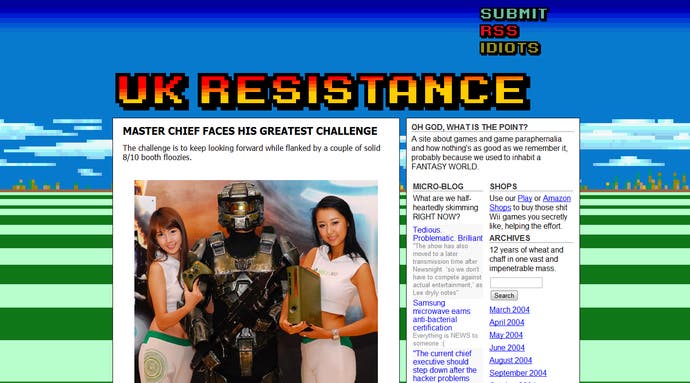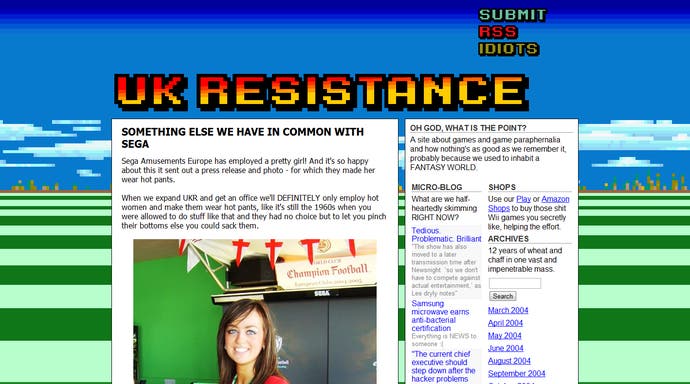UK Resistance: The War is Over
In memoriam.
Imagine you're at a funeral. The deceased's worst enemy turns up to pay his respects, falls down the stairs and breaks a leg. As his yelps of agony echo around the room, the corpse shoots bolt upright from the coffin, points a finger and screams "LOL!" before reclining once more. Silence.
Farewell then, UK Resistance. Such was the end of a unique site which puttered to a halt 15 years after its debut, and was tempted back out for one last pop at the PlayStation Network debacle.
From its beginnings in 1996, UKR was a Sega den. It was also less surreal than in later years, offering more in the way of news and reviews.
"In those days you could actually find really interesting things by just trawling through Sega Japan's web site," recalls Gary Cutlack, the site's co-founder and main writer.
But over time, UKR shifted towards more unusual content. "As the big sites raised their games and obliterated the amateurs, there wasn't any point in trying to compete with them by being 'proper'."
Themes emerged: excoriating Sony, the Dreamcast's fall, wondering about the motives of photographers, picking out truly abysmal games (and in some cases calling for the execution of their developers), watching Gizmondo implode, campaigning for blue skies in games and a constant drip of Sega tat – the more banal the better.

What exactly was on UKR? The kind of stuff you're not interested in until you know it exists. Whatever happened to Andy Crane? Or What are Yuji Naka's five favourite Manics albums?
Then there were old Sega adverts from Viz, the single most amazing Sega collectible ever, pics of Richard Jacques looking buff in a t-shirt (and the lowdown on what he thought of Oasis). Sometimes, it was mere prophecy and prediction.
It wasn't just Sony who got it in the neck (snicker). The games media, New Games Journalism, business executives and Dave Perry off Gamesmaster were all targets.
The games industry is a small world. Surely Cutlack, a tech and video games journalist for various outlets, has put more than a few backs up?

"The only proper troubles I can remember are Dorian Bloch of Chart-Track complaining that I published sales data and somehow implied he was a Nazi," says the villain.
"And those girl gamers, Versus or something like that, who got one of their boyfriends to phone my then-boss and threaten police action because of a comment about them being found dead in a ditch. The line, "What if someone read that and took it seriously?" was used.
"Oh, and the ill-advised update about "systematically murdering the makers of the 50 Cent game" which was supposed to be ironic in some way, but, I was informed by management, actually might have been considered an incitement to murder."
No biggies, then. Unlike the classic man wins gaming tournament updates, which peaked with a truly remarkable find.

With all that in mind it may seem bizarre that Shiny Media, an online startup with bags of cash, chose to buy UK Resistance outright from Cutlack (along with sister site Idiot Toys) back in 2007. Perhaps Shiny was encouraged by the fact UKR won the prize for Best Non-Commercial Site at the inaugural Games Media Awards that same year.
There may have been a clue in the trophy's title. UKR was never going to make a million. But nor could it solely be blamed for Shiny's subsequent haemorrhaging of cash or the company's bankruptcy by July 2009. Luckily, Cutlack had made a deal to take back ownership after a year.
He has already published his account of what went wrong. As you'd imagine, considering all the dosh, he's not bitter: "The only recurring annoyance about Shiny is that they had so much money and had such a big chance to do something. But didn't.
"I think they wanted me as a staff writer, and buying the sites were actually just a means to getting me in-house. That's how much money they were throwing about."








